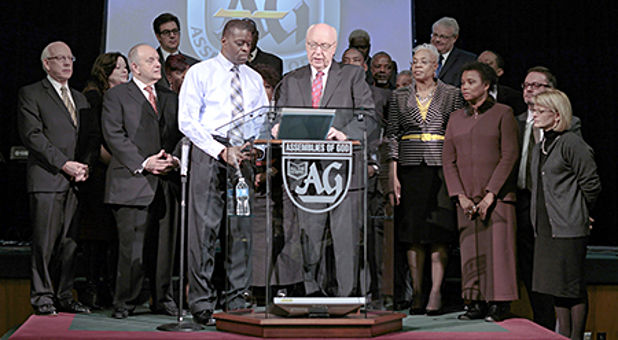Pentecostal Denominations Uniting After Nearly 100 Years of Division
After nearly 100 years of separation caused by a single decision in 1917, the Assemblies of God (AG) and the United Pentecostal Council of the Assemblies of God (UPCAG) are uniting for the cause of Christ.
“We have been on a four-year journey with the United Pentecostal Council of the Assemblies of God, which was birthed in 1919 because of racism in the Assemblies of God,” says Dr. George O. Wood, the general superintendent of the AG. “Now the Lord has brought us together again in a more formal partnership to hold high the name of Jesus and advance His mission in the power of the Spirit.”
The AG organized in 1914, and three years later, Alexander Howard, an African-American Pentecostal believer from Chicago, approached the AG and asked to be sent as a missionary to Liberia.
AG leaders at the time refused to appoint Howard—on account of his race.
Ultimately, Howard connected with a group of African-American churches in New England. This group organized in 1919 and in 1920 became the UPCAG partly to fulfill Howard’s purpose of going to Liberia as a missionary.
The AG and UPCAG remained separate organizations for nearly a century. Four years ago, Rev. Thomas Barclay, the international presiding elder for the UPCAG, was stirred to connect the two fellowships and mend the divide.
Under the banner of 1 Corinthians 1:10, which says, “I appeal to you, brothers, in the name of our Lord Jesus Christ, that all of you agree with one another so that there may be no divisions among you and that you may be perfectly united in mind and thought,” Barclay reached out to Wood, and they soon began an eager discussion on how to repair the relationship.
Barclay’s declaration began an important process of reconciliation. In recent decades the AG has sought to build bridges across ethnic, linguistic and cultural divides. More than 40 percent of the current AG membership in the United States is made up of ethnic minorities. To connect now with the UPCAG is both a natural and redemptive shift, one Wood calls “a vital forward step.”
Last year, UPCAG delegates and the AG executive presbytery approved plans for the cooperative affiliation. Under this agreement, any UPCAG church that so desires will be welcomed into local AG districts, as well as all national AG programs and missions while maintaining their own credentialing practices and autonomy.
It seems fitting that this historic reconciliation would culminate during Black History Month, when the UPCAG leadership joined the AG national team for a celebratory chapel service on Feb. 11.
“God has put us together, and there is something about to happen,” Barclay shared in his chapel sermon at the AG’s National Leadership and Resource Center in Springfield, Mo. “No longer will we be separated from you. We came to lock arms with you.”




























































